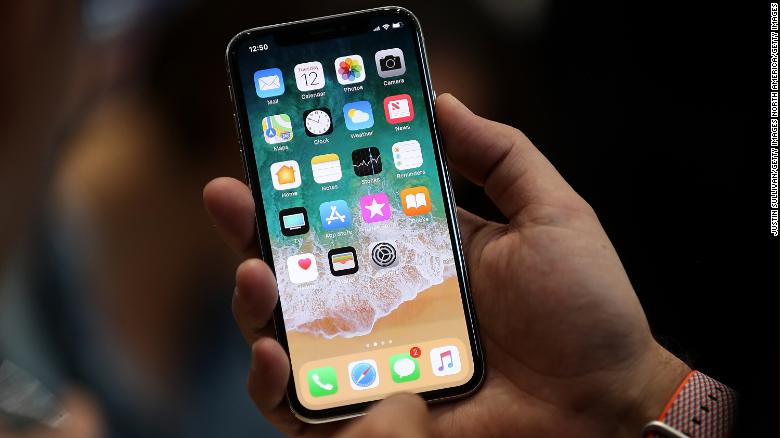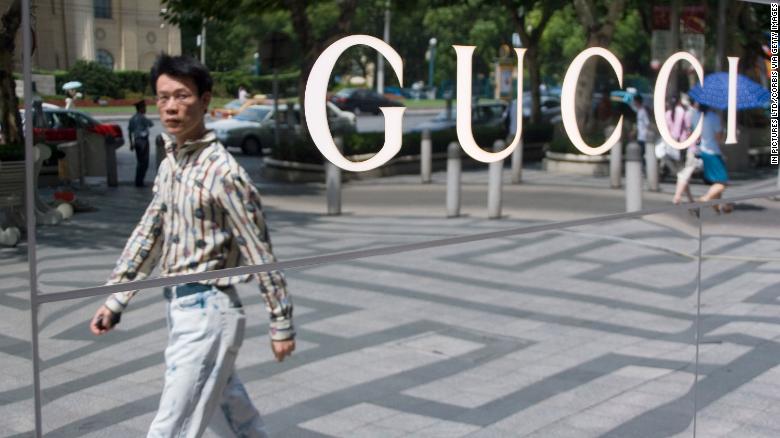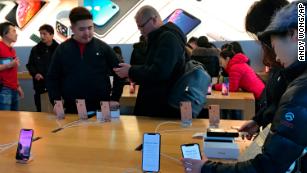
London -- Chinese shoppers are buying fewer smartphones.
Expensive handbags and watches could be next.
European luxury stocks were hit Thursday after Apple said it sold fewer iPhones than expected in the final three months of 2018 because of a sharp economic slowdown in China.
Shares in LVMH, which owns brands including Fendi and Louis Vuitton, were down 3%.
European luxury stocks were hit Thursday after Apple said it sold fewer iPhones than expected in the final three months of 2018 because of a sharp economic slowdown in China.
Shares in LVMH, which owns brands including Fendi and Louis Vuitton, were down 3%.
Burberry stock plunged 5.8% and Gucci owner Kering dropped 4%.
Swiss watchmaking group Swatch shed 3%.
Chinese luxury spending remained strong in the first half of 2018 despite a sluggish economy.
Chinese luxury spending remained strong in the first half of 2018 despite a sluggish economy.
But European fashion houses have not yet reported results for the end of the year, and investors are worried they main contain some nasty surprises.If Chinese shoppers weren't willing to spend big on a new iPhone, the thinking goes, they may have also put expensive purchases of luxury goods on hold.

A man walks past a Gucci store in Shanghai.

A man walks past a Gucci store in Shanghai.
Some evidence of a luxury problem has already appeared.
The Federation of the Swiss Watch Industry said that the number of watches sold in China slumped in November.
The Swiss Economic Institute added to worries Thursday, saying the country's watch producers have significantly lowered their expectations for orders over the next three months.
"The issue is not whether there is a slowdown [of luxury sales in China] ... but rather the magnitude of it," said Flavio Cereda, an analyst at the investment bank Jefferies.
The Chinese market
European luxury retailers have come to depend on Chinese consumers in recent years.
Chinese shoppers are responsible for a third of global luxury sales, according to a report by the consultancy Bain and Italian luxury federation Altagamma.
That translates to over $7 billion a year, according to McKinsey.
Bain predicts that Chinese shoppers will account for half of all luxury spending by 2025.
"China is key, hence the understandable volatility [in luxury stocks]," said Cereda.
 iPhone sales take a big hit from China slowdown
iPhone sales take a big hit from China slowdownThe industry has been stung before by its reliance on China.
Chinese shoppers abandoned luxury brands during a government crackdown on corruption that started in 2012.
The campaign made luxury products and watches off limits for Communist Party officials and corporate executives.
The big worry now, however, is weaker economic growth.
After decades of rapid expansion, the Chinese economy is slowing down.
Growth in 2018 is likely to have been the weakest since 1990, and this year looks even worse.
Two reports published this week suggest the country's huge manufacturing sector is contracting. There are also concerns about the country's real estate market, and its ongoing trade war with the United States.
 China's factory sector contracts for the first time since 2016
China's factory sector contracts for the first time since 2016"Given the ongoing China-US trade tensions, consumer confidence is sliding off highs," said Helen Brand, an analyst at UBS.
UBS predicts that Chinese luxury spending grew around 10% in second half of last year.
While that may seem high, it's a significant slowdown from the 16% growth recorded in the first half of 2018.
Brand said that a weaker Chinese yuan is causing shoppers to spend less abroad.
Vacation shopping makes up as much as two thirds of total Chinese spending on luxury.
Aucun commentaire:
Enregistrer un commentaire